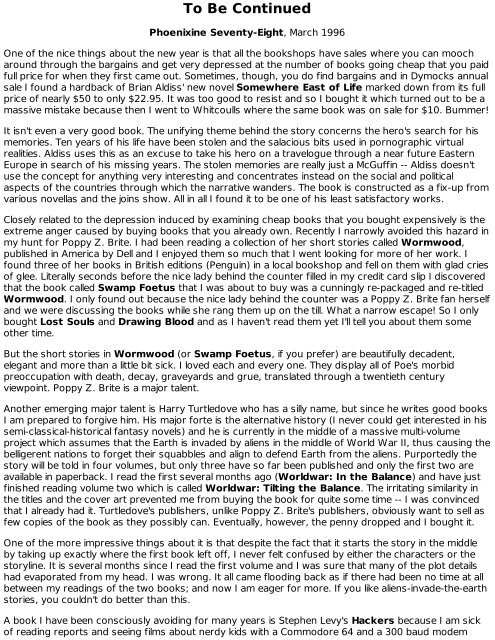Triffids Beard 2 - The Bearded Triffid
Triffids Beard 2 - The Bearded Triffid
Triffids Beard 2 - The Bearded Triffid
You also want an ePaper? Increase the reach of your titles
YUMPU automatically turns print PDFs into web optimized ePapers that Google loves.
To Be Continued<br />
Phoenixine Seventy-Eight, March 1996<br />
One of the nice things about the new year is that all the bookshops have sales where you can mooch<br />
around through the bargains and get very depressed at the number of books going cheap that you paid<br />
full price for when they first came out. Sometimes, though, you do find bargains and in Dymocks annual<br />
sale I found a hardback of Brian Aldiss' new novel Somewhere East of Life marked down from its full<br />
price of nearly $50 to only $22.95. It was too good to resist and so I bought it which turned out to be a<br />
massive mistake because then I went to Whitcoulls where the same book was on sale for $10. Bummer!<br />
It isn't even a very good book. <strong>The</strong> unifying theme behind the story concerns the hero's search for his<br />
memories. Ten years of his life have been stolen and the salacious bits used in pornographic virtual<br />
realities. Aldiss uses this as an excuse to take his hero on a travelogue through a near future Eastern<br />
Europe in search of his missing years. <strong>The</strong> stolen memories are really just a McGuffin -- Aldiss doesn't<br />
use the concept for anything very interesting and concentrates instead on the social and political<br />
aspects of the countries through which the narrative wanders. <strong>The</strong> book is constructed as a fix-up from<br />
various novellas and the joins show. All in all I found it to be one of his least satisfactory works.<br />
Closely related to the depression induced by examining cheap books that you bought expensively is the<br />
extreme anger caused by buying books that you already own. Recently I narrowly avoided this hazard in<br />
my hunt for Poppy Z. Brite. I had been reading a collection of her short stories called Wormwood,<br />
published in America by Dell and I enjoyed them so much that I went looking for more of her work. I<br />
found three of her books in British editions (Penguin) in a local bookshop and fell on them with glad cries<br />
of glee. Literally seconds before the nice lady behind the counter filled in my credit card slip I discovered<br />
that the book called Swamp Foetus that I was about to buy was a cunningly re-packaged and re-titled<br />
Wormwood. I only found out because the nice lady behind the counter was a Poppy Z. Brite fan herself<br />
and we were discussing the books while she rang them up on the till. What a narrow escape! So I only<br />
bought Lost Souls and Drawing Blood and as I haven't read them yet I'll tell you about them some<br />
other time.<br />
But the short stories in Wormwood (or Swamp Foetus, if you prefer) are beautifully decadent,<br />
elegant and more than a little bit sick. I loved each and every one. <strong>The</strong>y display all of Poe's morbid<br />
preoccupation with death, decay, graveyards and grue, translated through a twentieth century<br />
viewpoint. Poppy Z. Brite is a major talent.<br />
Another emerging major talent is Harry Turtledove who has a silly name, but since he writes good books<br />
I am prepared to forgive him. His major forte is the alternative history (I never could get interested in his<br />
semi-classical-historical fantasy novels) and he is currently in the middle of a massive multi-volume<br />
project which assumes that the Earth is invaded by aliens in the middle of World War II, thus causing the<br />
belligerent nations to forget their squabbles and align to defend Earth from the aliens. Purportedly the<br />
story will be told in four volumes, but only three have so far been published and only the first two are<br />
available in paperback. I read the first several months ago (Worldwar: In the Balance) and have just<br />
finished reading volume two which is called Worldwar: Tilting the Balance. <strong>The</strong> irritating similarity in<br />
the titles and the cover art prevented me from buying the book for quite some time -- I was convinced<br />
that I already had it. Turtledove's publishers, unlike Poppy Z. Brite's publishers, obviously want to sell as<br />
few copies of the book as they possibly can. Eventually, however, the penny dropped and I bought it.<br />
One of the more impressive things about it is that despite the fact that it starts the story in the middle<br />
by taking up exactly where the first book left off, I never felt confused by either the characters or the<br />
storyline. It is several months since I read the first volume and I was sure that many of the plot details<br />
had evaporated from my head. I was wrong. It all came flooding back as if there had been no time at all<br />
between my readings of the two books; and now I am eager for more. If you like aliens-invade-the-earth<br />
stories, you couldn't do better than this.<br />
A book I have been consciously avoiding for many years is Stephen Levy's Hackers because I am sick<br />
of reading reports and seeing films about nerdy kids with a Commodore 64 and a 300 baud modem


